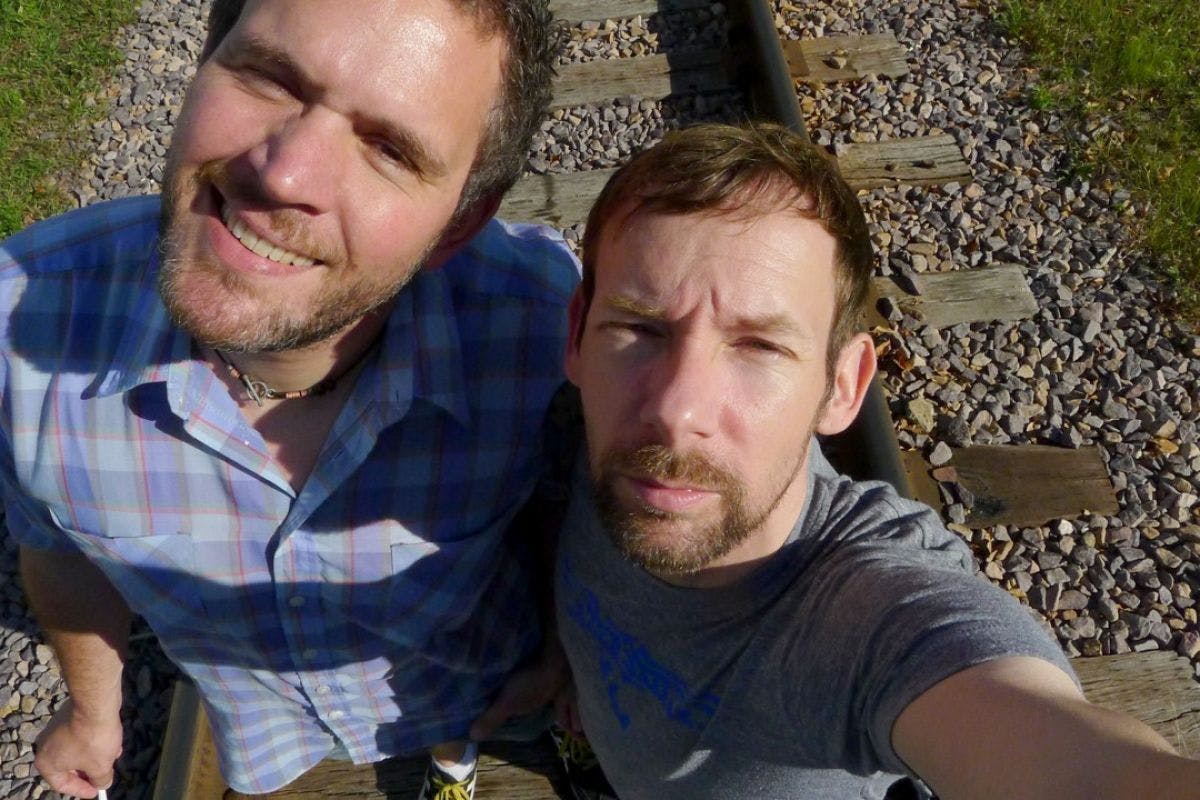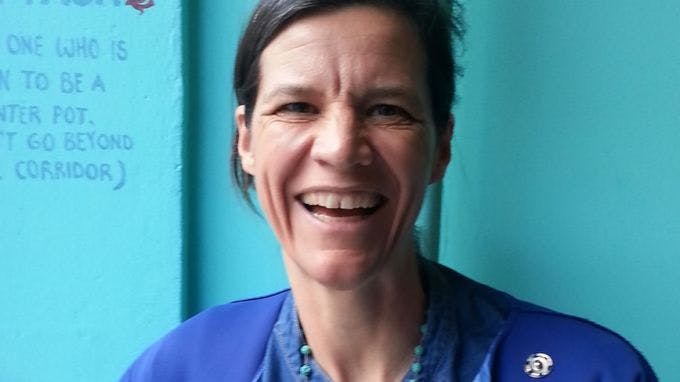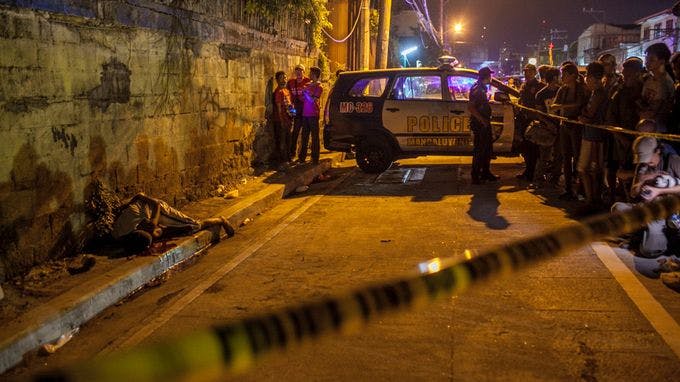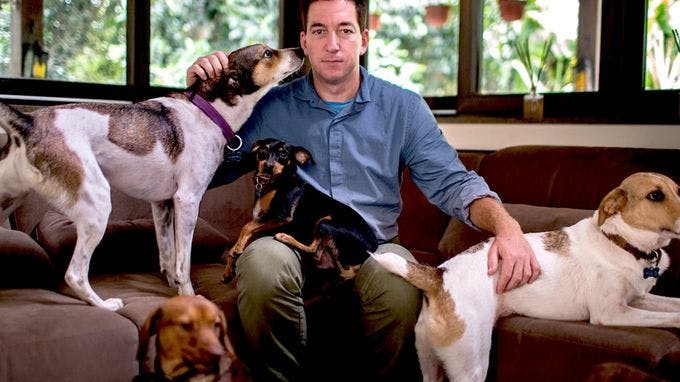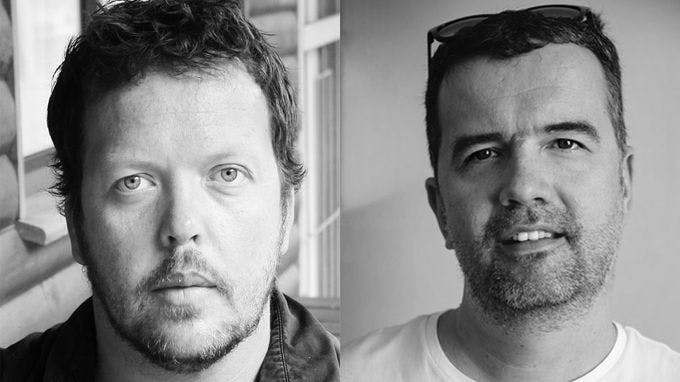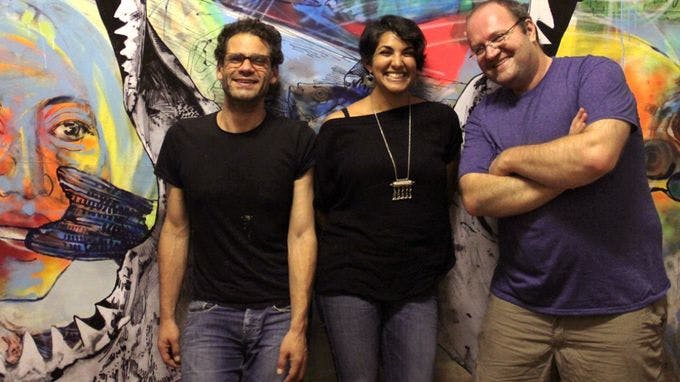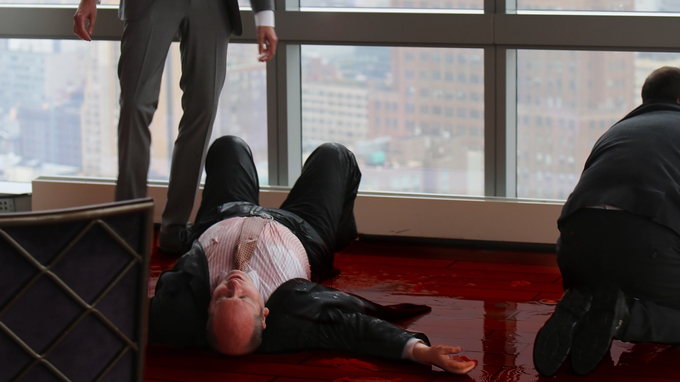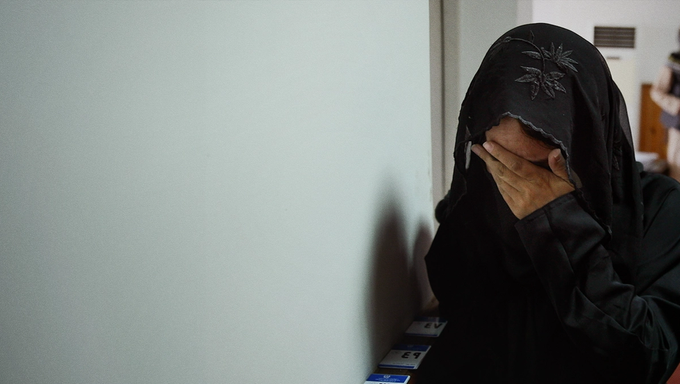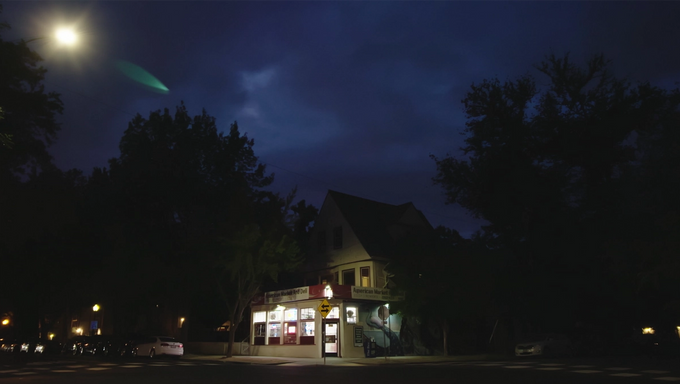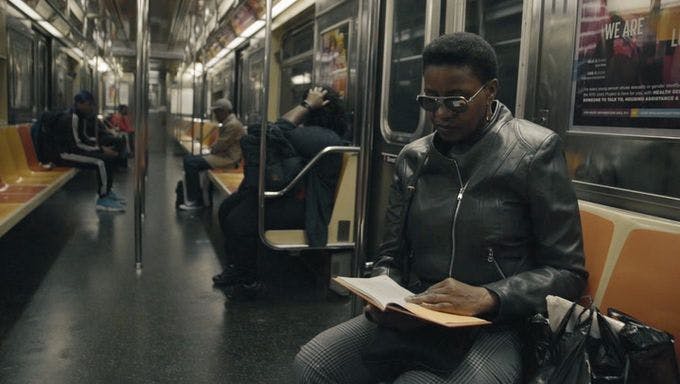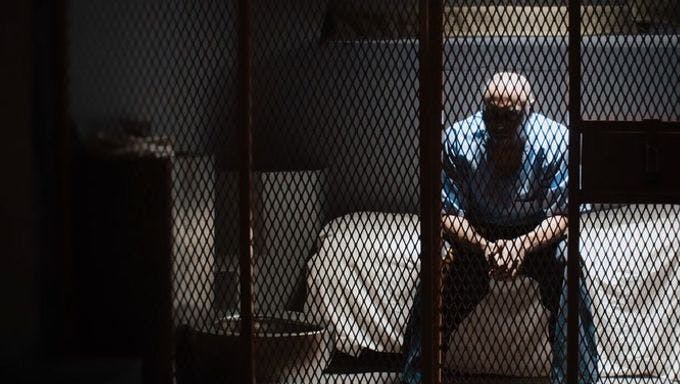As with other films in the series, Peace in the Valley started with an assignment from the FOV producers. According to West Coast-based directors Michael Palmieri and Donal Mosher, it didn’t take much convincing to get them on a plane to Eureka Springs, Arkansas. “They said — so there’s this town, there’s this vote, and there’s this big Jesus on a hill,” Palmieri said. “And we said OK.” While something of a departure from the duo’s previous films — October Country is a textured, lived-in portrait of a working class family, and Off Label is an expansive tour through our country’s addiction to prescription drugs — this new project offered them yet another vantage point on the complexities of American life. In this conversation, conducted the day before Peace in the Valley’s premiere at the New York Film Festival, they talked about the complex culture of Eureka Springs, which was thrown into flux by a recent gay rights ordinance, and how the politics and sensibilities of their subjects were refracted by their own.
Tourist at the base of Christ of the Ozarks statue, Eureka Springs, Arkansas.
Photo: Donal Mosher
Was there any particular angle that the Field of Vision team wanted you to pursue for this film?
Michael Palmieri: They just knew there was an ordinance, there was a vote, and they wanted us to go down and cover that. But whatever we wanted to do with that, we were encouraged to explore.
In such a short span of time, you present so many complicated facets to the situation and to the town.
Palmieri: But it’s just so evident. I guess it’s also how we look at this stuff. You don’t want to look at it through the standard boilerplate. There were other journalists down there, and we’d read stuff that was all just straightforward, and we were like, “How do you do this so it’s not just that?”
Donal Mosher: Compared to American ideas of what the South is, that place is an absurd carnival. Even if you don’t have an idea, it’s an absurd carnival. And people there know it, and treasure it. And that’s something I hope comes across. The way people feel about the place they live in.
The fact that you have one of the first major voices saying something to the effect of, well, I don’t have any problem with gay people, but economically this ordinance is a problem for us. That already goes beyond the standard expectations of the culture wars.
Palmieri: It’s evangelicals and bikers and the LGBT community essentially existing in basic harmony. You know — I’ll leave you alone if you leave me alone. But then something comes to a head like this, and all of a sudden everybody’s got an opinion. And they were vocalizing and having an open conversation.
Mosher: And of course he does have a problem with it. The one regret I have about working in such a short condensed form is you can’t get that much nuance. There’s a quality to this man that I don’t know can come across that fast.
Palmieri: He has the performative qualities that exist in the entire piece. He’s constantly on and performing — but you get little cracks where you can see when he’s not. But so is everyone else. People are performing a Passion Play. People are performing their roles in their political alignment. It’s all this giant play, is what it seemed like. Everyone’s in a performative mode all the time, though not always as pitched.
Mosher: Not everyone’s introducing Christ or spinning in drag.
I was fascinated by the young Christian man who works in the shop, who supports the ordinance.
Jayme Brandt, owner and designer of Twice Born, an apparel store in Eureka Springs, Arkansas.
Photo: Donal Mosher
Palmieri: Jayme’s critical. He’s really illustrating the greater conversation going on in the larger Christian community between the evangelical side that is afraid that their rights are being taken away — more conservative — and the much more liberal side that Jayme represents.
Mosher: But he also strongly identifies with the side of Christ who took on the money lenders. He gets a fanatical light in his eye when he talks about the rebel Christ. He’s the most interesting character to me, because he is progressive, or what we consider progressive, and yet he is deeply religious. Christ is a role model for everyone, and he really applies it to his life. In a way that we don’t get to see in American media that often. At the same time he has another nuance that I wish we could catch. By putting himself in that position and supporting the traditional enemies of the conservative church, he also has gaps in his own faith, and has to wrestle with things. The whole town is kind of struggling with a rapidly changing ideology. They have to. Most of them just roll with it in a sweet southern way.
You’re not used to seeing such a variety of conviction around these issues in this country.
Palmieri: We felt like we’d come across something much larger, and we’re really interested in exploring these voices. There is obviously a way that you can look at Christians if you’re coming safe from the left, but it’s actually more complicated. And the conversations are more complicated. And the respect is more complicated to gain. And to their credit, the evangelicals let us in to have these conversations with them. So we really respect that, and want to continue working with them. Plus the passion plays are so awesome.
Portraits of a popular Jesus actor from the Great Passion Play, an outdoor drama that presents the last days of Christ, Eureka Springs, Arkansas.
Photo: Donal Mosher
There’s potential for comedy — there are comedic moments, there are notes that can be handled as laugh lines — but you don’t press on that too hard. How do you negotiate taking everyone seriously but also letting humor come through?
Palmieri: You want to find both. I think viewers are smart enough to see Christopher Guest moments and then also smart enough to see much more subtle things that are there. It’s not all just one thing.
Mosher: You have to sort of trust as well. I’m hoping that this is a sensitive audience. A lot of what we find comedic about the characters, they themselves are not going to find funny. If we’re on our game, they’re not going to read it as condescending either — and I don’t want them to. But I can’t also deny the fact that to me this is a form of camp — equivalent to a drag show. And so it’s tricky. Hopefully you can get a little moment like when the actor who plays Christ says, “It’s physically and spiritually demanding,” and he’s just got a little look on his face. You hope that by including a moment like that, it bounces off of all the other comedic moments. But all he’s doing is laying the business bare. To us it’s really funny, but to him it’s the practicalities of doing his job.
Palmieri: I don’t think he would interpret it the same way that I’m interpreting it, and it wouldn’t be interpreted as negative. Because it’s just the way that he believes and the way that he presents himself. But it’s OK for another person to interpret it in a different way. And that’s what’s fun, because you get to have both, which is always the thing you’re looking for.
Mosher: Although I don’t know how they’re going to feel about the juxtaposition between a drag show and the Passion Play. That may cross a line. But that’s my line. We’re gay men, I grew up in the South, and that’s the point where I want to actually be like, I’m sorry if this insults you, but this is the statement I need to play with.
Palmieri: But at the same time, they’re also trying to orchestrate conversations with the evangelicals about bringing transgender people in, for reconciliation. So that’s all we’re attempting to show in the film. Like, how unalike really are you? There’s plenty that is different, but there’s plenty that’s similar. And that seems like something to work towards.
They might find it disrespectful, but for you camp isn’t disrespectful at all.
Mosher: No, not at all. And in the South, especially, that is a mode of survival for a lot of people. I really do think of the Passion Play, which is lip-synced to a soundtrack, as exactly the same thing [as a drag show]. But each one is celebrating their own — whatever thing you want to define as faith or spirituality — that supports their lives. There are even little things that didn’t make it into the film, like Kent, the Christ actor, says, “I like to play Christ, but I also like to play Judas, you know? It depends on what dress I’m wearing that day.” And there’s a Bible that they have in their Bible museum, where they have a misprinting in what they call the “He Bible.” Because it has a passage about Ruth entering the city but it says “he” where it should say “she.” And Randall Christie is very proud of this rare Bible. Then all of a sudden it clicks what he’s actually talking about.
Contestant for Miss Eureka Springs during Diversity Weekend, which brings in LGBT tourists from across the state.
Photo: Donal Mosher
Palmieri: And more importantly how we might use it contextually. And that’s where you get those cracks.
Mosher: But it’s just funny how the whole environment is saturated back and forth between the language of one party and the language of the other.
Donal, did your being from the South help at all in terms of relating and earning trust?
Mosher: Some, but I’m only half from the South. And it’s been a long time. And if you grew up in North Carolina, Arkansas is like the Midwest.
Did they engage with you in terms of how you felt about these things, about the ordinance, about your politics or faith? Palmieri: Oh sure. But at the same time I think people just waited to see where we were going. We’re really good about being honest about what we’re doing. There’s never any surreptitious mode of operation, because I always think that doesn’t result in anything useful or helpful. The only instance where we actually had people being concerned, and rightly so, were some of the democratic operatives from Little Rock who were there to help organize the human rights campaign. Once they saw the camera, they stopped us and said, “Wait, where are you from?” They were making sure that it wasn’t some smear campaign against the people who were fighting for tolerance.
Mosher: Because there had been a lot of videos that came out about how gay, lesbian and transgender people are coming to your town and taking over. I mean, talk about camp. But I was a little taken aback that somebody who I would consider as being on my own team was grilling me with more suspicion than other people were. But it also made me realize what the stakes are, and who held more power. Because for the Christian Right, they understand that they’ll be smeared by the left anyway, and they’re confident enough in their power that they can let that happen. But for the left there, they don’t have that liberty.
How would you even anticipate that element of the political dynamic? It’s hard to go in knowing that.
Mosher: But immediately I felt that if I hadn’t lived away from the South for so long, of course I would have felt that way. It wouldn’t have surprised me at all. But I’ve lived in San Francisco and Portland and these little bubble areas. This project was really important to me; I felt like I was going back to when I was a kid, getting the shit beat out of me. Engaging that material, and dealing with something other than, oh no the rents are going up. Those are serious struggles, but they’re different struggles. And I think for anyone who’s gay, especially of a certain generation, it’s a serious thing. It’s not easy for a lot of younger people who are outside of the South, or other very rural areas, to understand what it takes to struggle that way.
Young opponent of the Eureka Springs anti-discrimination ordinance.
Photo: Donal Mosher
Was it uncomfortable to be there for you? Mosher: No, I loved it.
Palmieri: It’s beautiful there. But it’s also such an enclave. Once you go outside of Eureka Springs, you’re in a different place, it’s not as tolerant. All the loose marbles are in Eureka Springs. Or as they like to say, they’re the hole in the buckle of the Bible belt.
Mosher: I could drink whiskey and quote the Bible — I don’t get to do that in Portland very often.
That liberal Christian voice, which is so important for the conversation, gets drowned out of the conversation. But it’s there, it’s within congregations, it’s within churches.
Mosher: The whole town, from church to church, you can get various shades. There’s a preacher who didn’t make it into the cut, who is squarely in the middle. He’s not against the principle of the ordinance, but he was against the particular mode of how it was set up and what it was doing to the community. He was the most Christian, gentle kind of shepherd. He talked to us about how he had come to appreciate his homosexual neighbors because of the way they went to church, and how they showed the church love. That’s something you don’t hear about — everyone gets divided. The thing that interests me the most is when he says, “And I saw Christ in them.” That constant framework of Christ — everybody down there is either looking through or having to look around it. Everyone thinks of it as a viewfinder, but it’s really a kaleidoscope. And that’s what’s really interesting about that area. Especially for a leftist, intellectual or atheistic audience, very few of us look through this lens of the role model of Christ, and bending language around Christ. One of the comic moments is Randall Christie comparing his bad day to whippings and bleedings, which seems ridiculous — although we’ve all made such ridiculous claims ourselves — but he’s sincere.
It’s their language.
Palmieri: It’s the language of their lives. It’s the language of the burden of Christ. So it makes sense that evangelicals would feel that they’re under some burdensome pressure. Because that’s their main story, the story they derive their beliefs from. So it’s important for people to be tolerant of the fact that that’s their operating space.
Mosher: But it’s also a political trick by savvy people who understand how to manipulate their kind. And this is why it’s really interesting.
Photography: Donal Mosher
